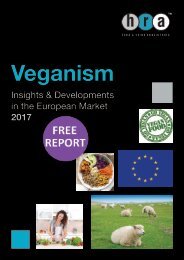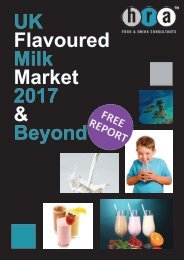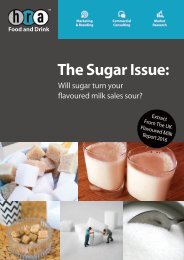European Lactose-Free Market Report 2017/2018 Report
Dying to know what’s going on in the hottest Free From category? Looking for something different to those tedious reports filled with nothing but data and no insight? Looking for detailed category analysis from experienced specialists to give your brand the ‘Edge’?
Dying to know what’s going on in the hottest Free From category?
Looking for something different to those tedious reports filled with nothing but data and no insight?
Looking for detailed category analysis from experienced specialists to give your brand the ‘Edge’?
You also want an ePaper? Increase the reach of your titles
YUMPU automatically turns print PDFs into web optimized ePapers that Google loves.
5.2.3 PLANT-BASED MILKS AND HEALTH<br />
THE EUROPEAN LACTOSE-FREE MARKET <strong>2017</strong>/<strong>2018</strong><br />
§ Some consumers believe that plant-based dairy alternatives are the healthier<br />
option when compared with traditional white cows’ milk. Naturally low in saturated<br />
fats and high in fibre, these dairy alternatives may be attractive to people watching<br />
their weight or cholesterol.<br />
§ Plant-based milks are naturally dairy & lactose-free, making them a good<br />
alternative for people suffering from milk allergies or lactose-intolerance. These<br />
milks are also free of animal products, making them a suitable dairy alternative for<br />
vegans.<br />
§ Plant-based milks lack the calcium and vitamin B12 naturally found in cows’ milk.<br />
However, plant-based milks are often fortified with these compounds to optimise<br />
consumer health.<br />
§ Plant-based milks often lack the protein found in dairy products, which could affect<br />
muscle production in the body. Protein also adds to the ‘full-up’ feeling, so<br />
consumers of non-dairy milks may have to consume more to feel satiated.<br />
§ Some plant-based milks contain potentially harmful compounds if consumed in<br />
large quantities - soya milk contains phytoestrogen which can harm both male and<br />
female fertility, whilst rice milk contains very low-levels of arsenic.<br />
§ Some plant-based milks contain added sugar, so consumers need to check the<br />
packaging for nutritional content.<br />
§ Nutritional values of plant-based milks differ by ingredients and product. Soya milk<br />
has a fat and protein content close to cows’ milk, whilst oat milk is low in fat and<br />
high in dietary fibre (see figure 5.3).<br />
All rights reserved, ©Teepee Ltd, t/a HRA Food & Drink: <strong>2017</strong> 24







